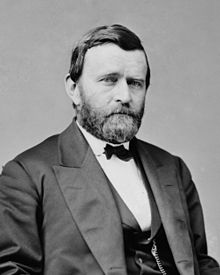Reforms of the Ulysses S. Grant administration | |
|---|---|
 President Grant, c. 1870 | |
| 18th President of the United States | |
| In office March 4, 1869 – March 4, 1877 | |
| Personal details | |
| Born | Hiram Ulysses Grant April 27, 1822 Point Pleasant, Ohio, U.S. |
| Died | July 23, 1885 (aged 63) Wilton, New York, U.S. |
| Resting place | General Grant National Memorial Manhattan, New York |
| Political party | Republican |
| ||
|---|---|---|
|
Personal 18th President of the United States Presidential campaigns
 |
||
During Ulysses S. Grant's two terms as president of the United States (1869–1877) there were several executive branch investigations, prosecutions, and reforms carried-out by President Grant, Congress, and several members of his cabinet, in the wake of several revelations of fraudulent activities within the administration. Grant's cabinet fluctuated between talented individuals or reformers and those involved with political patronage or party corruption. Some notable reforming cabinet members were persons who had outstanding abilities and made many positive contributions to the administration. These reformers resisted the Republican Party's demands for patronage to select efficient civil servants. Although Grant traditionally is known for his administration scandals, more credit has been given to him for his appointment of reformers.
It was with the encouragement of these reformers that Grant established the first Civil Service Commission, and ended the moiety system. Many in his cabinet including his Secretary of State Hamilton Fish and his Secretary of Interior Jacob D. Cox implemented Civil Service reform in their respective departments. Historian H.W. Brands has noted that the Grant Administration thwarted the 1869 Gold Ring in addition to the successful prosecution the Whiskey Ring in 1876. The Grant administration took place during Reconstruction and a boom and bust economy following the Civil War that fueled financial corruption in Government offices.
Several of Grant's cabinet members supported and implemented Civil Service reform in their respected federal departments. President Grant signed a bill into law that allowed the Postal Department to prosecute pornography through the mail, a law that is still in effect today. Grant appointed several leading reformers including Hamilton Fish, Benjamin Bristow, and Edwards Pierrepont. During his first administration Grant prosecuted and shut down the Ku Klux Klan under the Enforcement Acts he signed into law in 1870 and 1871. Grant, a trained military leader, was often at odds with Cabinet reformers who he believed were insubordinate to his administration. On several occasions, Grant dismissed cabinet reformers without notice or explanation.

